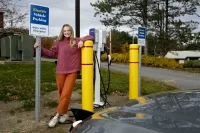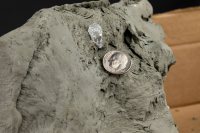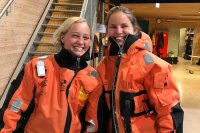
Penn State geoscientist to discuss abrupt climate change
Richard Alley, whose book The Two-Mile Time Machine (Princeton University Press, 2002) offers surprising conclusions about Earth’s climate, visits Bates College to give a lecture titled Abrupt Climate Change, the Greenhouse Effect, and How We Can Make Money Cleaning up After Ourselves at 7 p.m. Thursday, March 10, in Chase Hall Lounge, 56 Campus Ave.
Sponsored by the College Lecture Series, the event is open to the public at no charge. For more information, please call the college concierge at 207-786-6255.
Alley is the Evan Pugh Professor of Geosciences at Pennsylvania State University. His research interests include glaciology and ice sheet stability, as well as the use of ice cores to study past climates. His current work focuses on abrupt climate change and sea level change, and he is considered one of the world’s leading researchers in that field.
Alley is one of the scientists whose study of ice cores in Greenland in the early 1990s led to current theories about the potential for rapid large-scale changes in global temperature. Specificially, the team determined that the most recent Ice Age ended within only three years.
In The Two-Mile Time Machine, a Phi Beta Kappa national Science Award winner, Alley recounts the Greenland research and provides the first popular account of the wild climate fluctuations that prevailed through much of prehistory. He discusses the role that major ocean currents play in our weather, and how those in turn are affected by changes in massive ice sheets such as those around the North and South poles.
Explaining that human civilization has emerged during an unusually stable climatic era, Alley also warns that the environment that we consider normal could end within just a short span of years. He has brought these findings to a broad audience through appearances on television (including public television’s influential series Nova), radio and print (including The New York Times and Time Magazine). He has also served as an adviser on the topic to the U.S. government, including a variety of science agencies, the U.S. Senate and Al Gore during his tenure as vice president.
Alley received his bachelor’s and master’s degrees at Ohio State University and his doctorate at the University of Wisconsin at Madison.




